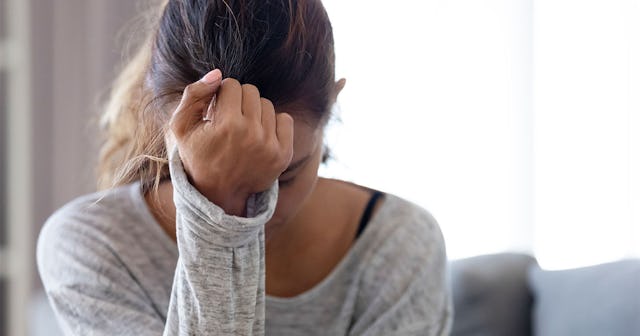Meditation Makes My Anxiety Worse

I was lying in bed the other night, vegging out and watching TV, when my husband entered the room. He lay down beside me, shutting off my movie and turning out the lights. He grabbed his phone and turned up the audio. He made sure his volume was at a moderate level, and then he launched a guided meditation. A deep breath in, deep breath out sorta thing.
I tried to follow along. My body was still and eyes were closed. I was in the supine position, lying horizontally with my face and chest up, and I listened to every suggestion, word and command. To the outsider, I probably looked peaceful and restful. But my breathing was erratic. I struggled to stabilize my heart rate and breath. My legs were shaking. I could feel my body vibrating, bouncing up and down. My mind was racing. My thoughts were consistent, constant and all over the map — because meditation makes me anxious. I was fighting off a full-blown panic attack.
Of course, I know how strange and silly this sounds. Meditation is supposed to relax the mind, after all. It should calm my body and soul. Yet it doesn’t. I’ve tried more than a dozen times — in different positions and locations, and with different audio tracks — and nothing seems to stick. Focusing on my breath makes me breathe harder. It elevates my heart rate and puts my mind into overdrive. I sweat, profusely. I quiver and shake. And the resulting feeling makes me more anxious. Quiet is my enemy. Calm is not my friend.
And it turns out, I am not alone. One out of every 12 people who try meditation experience unwanted negative effects, like a worsening of their depression and/or their anxiety, a study out of Coventry University found.
“For most people it works fine but it has undoubtedly been overhyped and it’s not universally benevolent,” Miguel Farias, one of the researchers behind the work, recently explained. “People have experienced anything from an increase in anxiety up to panic attacks,” Farias adds. They also found instances of psychosis or thoughts of suicide. And that is the case with me. When I am quiet, my mind wanders. The negative voices in my head get louder, i.e. they tell me I am not good enough or smart enough. I should disappear. Run away. I struggle to be still. I need to go. To do. To be. To act. And if I am in the midst of a depressive episode, the voices tell me I should end it. Silence amplifies my suicidal thoughts.
And this isn’t the only study to reach these findings. A 2017 study from Brown University found meditators often report feelings of fear, anxiety, panic, and paranoia. Meditation teachers also acknowledge the prevalence of these side effects.
“Sometimes when people are trying to still their thoughts, the mind can ‘rebel,’” Katie Sparks, a chartered psychologist and a member of the British Psychological Society, recently told New Scientist. “It’s like a backlash to the attempt to control the mind, and this results in an episode of anxiety or depression,” she says.
Make no mistake: These studies have flaws, i.e., many are self-reported and small in size. They also can — and on occasion, do — include individuals already in crisis, skewing the results. However, if you experience symptoms of heightened anxiety before, during or after meditation, know you are not alone. The practice is not for everyone.
As for me, I’ve decided not to try meditation again — at least not anytime soon. Instead, I’ll focus on coping strategies which do work for me. I run, far and fast; most weeks, I log 30 miles or more. I see my therapist every Thursday. When in crisis, I text her. We schedule an abbreviated but urgent catch up call. I speak with my psychiatrist twice a month. Having been there in times of crisis, he is a lifeline. A safe space. And I take medication as needed, without guilt or shame. Because it doesn’t matter what you do — what matters is how you feel when doing it.
If mediation works for you, great. Keep up the practice. But if it doesn’t, if you leave a session feeling worse than you did when you went in, stop. Consider why, and reassess the situation. It’s important to know what is right for you, your body and mind.